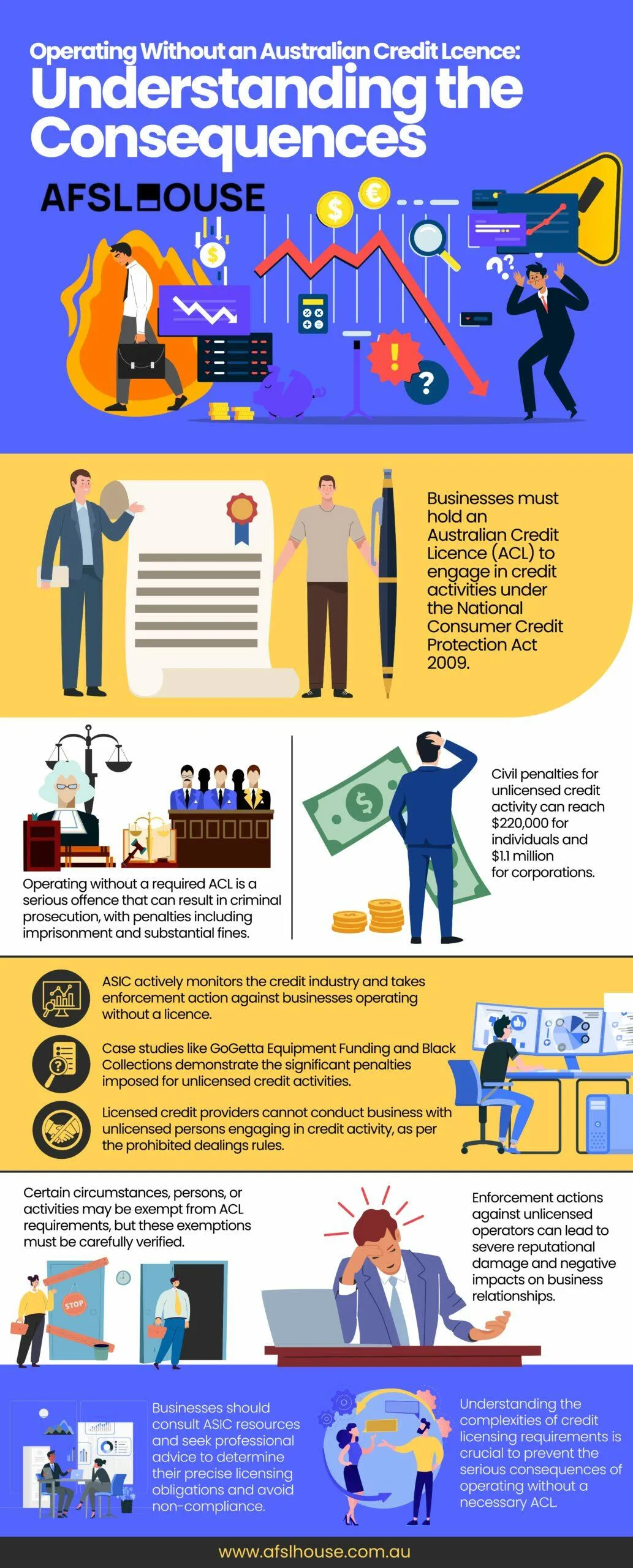Introduction
Engaging in credit activities in Australia necessitates holding an Australian Credit Licence (ACL). This legal requirement, mandated by the National Consumer Credit Protection Act 2009 (Cth), ensures businesses comply with regulations designed to protect consumers and maintain market integrity when providing credit services.
Operating without the required credit licence carries significant risks, including substantial penalties and enforcement action by the Australian Securities and Investments Commission (ASIC). This guide outlines the serious consequences businesses face when engaging in credit activities without holding a valid ACL, highlighting the importance of understanding these legal requirements.

The Legal Requirement to Hold an Australian Credit Licence
Defining Credit Activities Requiring a Licence
Under Australian law, specifically the National Consumer Credit Protection Act 2009 (Cth), businesses must hold an ACL if they engage in specific ‘credit activities’. Determining whether your business operations require a licence involves understanding what constitutes a credit activity.
The National Consumer Credit Protection Act 2009 (Cth) defines two broad categories of credit activities that generally require an ACL:
- Activities directly related to providing credit contracts or consumer leases, and securing obligations under those contracts.
- Providing credit services.
These categories encompass a range of specific actions. You are likely engaging in credit activities if your business involves:
- Providing credit: Acting as the credit provider under a credit contract.
- Providing consumer leases: Acting as the lessor under a consumer lease.
- Benefiting from security: Holding rights as a mortgagee over property securing a credit contract, or being the beneficiary of a guarantee related to a credit contract.
- Exercising rights/obligations: Performing the duties or exercising the rights of a credit provider, lessor, mortgagee, or beneficiary, either directly or on their behalf (e.g., collecting payments).
- Providing credit assistance: This includes suggesting that a consumer apply for, increase the limit of, or remain in a specific credit contract or consumer lease with a particular provider. It also covers assisting a consumer with their application process.
- Acting as an intermediary: Facilitating the process between a consumer and a credit provider or lessor to secure credit or a lease for the consumer. This can include brokers, mortgage managers, and aggregators.
- Debt management services: Providing assistance specifically related to managing debts or credit reporting issues.
It is important to note that these activities only trigger the licensing requirement if they relate to credit contracts or consumer leases covered by the National Credit Code. This generally includes credit provided to individuals for:
- Personal, domestic, or household purposes
- Residential property investment
The Offence of Engaging in Unlicensed Credit Activity
Engaging in credit activities without holding the necessary ACL is a direct violation of Australian law. Section 29 of the National Consumer Credit Protection Act 2009 (Cth) clearly establishes this prohibition.
Operating without holding a credit licence when one is required is an offence. This legal requirement applies to both individuals and corporations involved in providing regulated credit services or engaging in other defined credit activities.
Failure to comply with this fundamental obligation forms the basis for significant penalties. Furthermore, section 31 of the National Consumer Credit Protection Act 2009 (Cth) makes it an offence for a credit licensee to conduct business with unlicensed persons.
Significant Penalties for Operating Without a Licence
Potential Criminal Penalties
Engaging in credit activities without holding the required ACL is a serious offence under the National Consumer Credit Protection Act 2009 (Cth) and can result in criminal prosecution. Individuals involved in operating without a licence face significant personal risk. If convicted, the maximum term of imprisonment is two years.
Substantial financial penalties can also be imposed by the courts. The maximum criminal monetary penalties are structured as follows:
- For individuals: The greater of 5,000 penalty units or three times the benefit obtained and detriment avoided through the unlicensed activity.
- For corporations: The greater of 50,000 penalty units, three times the benefit obtained and detriment avoided, or 10% of the annual turnover (capped at 2.5 million penalty units).
Significant Civil Penalties
In addition to criminal charges, operating without an ACL can attract significant civil penalties. ASIC has the authority to pursue these penalties through the courts for contraventions of the licensing requirements.
These civil penalties can be substantial, adding considerable financial risk for non-compliant businesses and individuals. Courts may impose penalties of:
- Up to $220,000 for individuals
- Up to $1.1 million for corporations found to be operating without the necessary credit licence
Speak with an AFSL Lawyer Today
Request a Consultation to Get Started.
ASIC Enforcement Actions & Case Studies
ASIC Surveillance & Enforcement Focus
ASIC actively monitors the financial services industry. A key part of ASIC’s role involves conducting surveillance to identify businesses engaging in credit activities without holding the necessary ACL.
ASIC targets businesses operating without a credit licence as part of its commitment to:
- Consumer protection
- Maintaining the integrity of the credit industry
Enforcement action is taken against firms and individuals found to be providing credit services or engaging in other credit activity while unlicensed.
Case Study: GoGetta Equipment Funding Fined for Operating Without an ACL
GoGetta Equipment Funding Pty Ltd provides a clear example of the consequences of operating without the appropriate licence. ASIC initiated proceedings against GoGetta, leading to a significant penalty imposed by the Federal Court.
The company was ordered to pay $750,000 for engaging in unlicensed consumer leasing. Between April 2015 and December 2016, GoGetta entered into rental agreements with consumers for motor vehicles used primarily for personal purposes, which constituted consumer leases under the National Consumer Credit Protection Act 2009 (Cth).
The violations by GoGetta included:
- Contravening section 29 of the Act by not holding an ACL authorising it to enter into consumer leases
- Contravening section 32 by demanding and receiving payments related to these leases on numerous occasions without holding a licence
The Court noted these contraventions resulted from a systemic failure by GoGetta to implement effective processes for verifying the purpose of the lease (business vs. personal use).
Case Study: Black Collections Fined for Operating Without an ACL
Another instance involved Black Collections Pty Ltd, a debt collection agency. ASIC prosecuted the company, resulting in a conviction for engaging in unlicensed credit activities.
Between October 2016 and March 2018, Black Collections collected consumer credit debts without holding an ACL and without qualifying for an exemption. The company pleaded guilty and was convicted and fined $8,800 for this unlicensed credit activity under section 29(2) of the National Consumer Credit Protection Act 2009 (Cth).
Additionally, Black Collections was fined $4,400 for falsely representing that it held a licence authorising the collection of consumer debts when it did not, contravening section 30(3) of the Act. This case underscores that debt collection related to consumer credit contracts is a credit activity requiring appropriate licensing.
Other Consequences of Unlicensed Operation
Prohibited Dealings Implications for Licensees
Beyond direct penalties, operating without an ACL can significantly impact business relationships. Section 31 of the National Consumer Credit Protection Act 2009 (Cth) establishes clear prohibitions for licensed entities.
Key prohibited dealings include:
- Credit licensees cannot conduct business with unlicensed persons engaging in credit activity
- Licensed lenders are not permitted to work with mortgage brokers who lack the required ACL
- Licensees may commit an offence if they are ‘reckless’ about verifying the licensing status of their business partners
This prohibition serves to maintain the integrity of the credit industry by effectively isolating unlicensed operators from legitimate business channels.
However, these restrictions do not apply when the licensee is dealing with:
- Persons holding valid exemptions from licensing requirements
- Individuals acting as authorised credit representatives for another licensee
- Representatives of exempt persons
Therefore, verifying the licensing status of business partners is crucial for maintaining compliant operations within the credit industry.
Speak with an AFSL Lawyer Today
Request a Consultation to Get Started.
Reputational Damage & Business Impact
Enforcement actions taken by ASIC against businesses operating without a credit licence can lead to substantial reputational damage. Public exposure following court proceedings can severely harm a company’s standing in the marketplace.
For example, the significant penalty imposed on GoGetta Equipment Funding highlights how non-compliance becomes public knowledge. Findings of systemic failures, like those noted by the court in the GoGetta case, further erode trust among both consumers and industry partners.
The imposition of significant criminal and civil penalties signals serious operational or ethical shortcomings, including:
- Substantial fines for businesses
- Potential imprisonment for individuals involved
- Public documentation of compliance failures
This negative publicity ultimately affects not only a business’s viability but also its relationships within the broader financial services sector.
Understanding Exemptions & Ensuring Compliance
Identifying Potential Exemptions from Licensing
While engaging in credit activities generally requires holding an ACL, certain specific circumstances, persons or activities may be exempt. It is crucial to carefully verify any applicable exemptions to ensure you do not unintentionally operate without a licence.
You do not need to hold a credit licence if you fall into one of the following categories:
- Representatives: Acting as an authorised credit representative for a licensed principal, or being an employee or director of a licensee (or their related body corporate) engaging in credit activities on their behalf.
- Specific Roles: Exempt under the National Consumer Credit Protection Regulations2010 (Cth), such as
- Insolvency practitioners (receivers, liquidators, registered debt agreement administrators)
- Financial counselling agencies that meet specific criteria
- State or territory licensed debt collectors acting for a licensee
- Referrers: Merely referring a consumer to a licensee or representative may be exempt if you
- Disclose any benefits received, and
- Follow the procedures for either downstream referrals (providing contact details to the consumer) or upstream referrals (passing consumer details to the licensee)
- Suppliers of Goods or Services: Arranging credit from a linked credit provider solely for the purchase of your goods or services, or in relation to branded/co‑branded credit cards, may be exempt under regulations 23 and 23A. However, these exemptions do not apply to land sales or unsolicited contact.
Moreover, additional exemptions exist under the National Consumer Credit Protection Act 2009 (Cth) and its associated regulations for:
- Carried over instrument lenders under certain conditions
- Lawyers or registered tax agents acting in their professional capacity
- Certain public authorities
Always confirm the specific requirements and limitations of any potential exemption before proceeding.
Seeking Guidance on Licensing Requirements
Determining whether your business activities necessitate holding an ACL—or if an exemption applies—requires careful consideration, given the complexity of the rules and the significant consequences of operating without a licence.
Businesses should consult official resources provided by ASIC, including:
In addition, obtaining independent professional advice is highly recommended. Financial services lawyers or compliance consultants can:
- Regulatory Guide 203 (RG 203): ‘Do I need a credit licence?’ offers detailed information to help assess licensing obligations.
- ASIC Website: The credit licensing section on the ASIC website provides comprehensive regulatory guides and information sheets.
- Assess your specific business model against the requirements of the National Consumer Credit Protection Act 2009 (Cth)
- Help determine your precise obligations, ensuring you avoid engaging in unlicensed credit activity
Speak with an AFSL Lawyer Today
Request a Consultation to Get Started.
Conclusion
Engaging in credit activities under the National Consumer Credit Protection Act 2009 (Cth) without the necessary ACL exposes businesses to severe consequences. The potential repercussions encompass substantial criminal and civil penalties, focused enforcement action by ASIC, restrictions on dealings with licensed entities, and considerable harm to reputation, though specific exemptions might exist in certain situations.
Understanding the complexities of credit licensing requirements is vital to prevent these serious outcomes. For trusted expertise and guidance on your ACL obligations or if you have concerns about whether you need to apply for an ACL, contact the specialists at AFSL House, our financial services law firm, today to ensure your business remains compliant.
Frequently Asked Questions
The National Consumer Credit Protection Act 2009 (Cth) requires businesses engaging in credit activities to hold an ACL. Operating without the required licence is an offence under section 29 of this Act.
Engaging in ‘credit activities’ generally requires an ACL, which broadly includes providing credit under a credit contract or being a lessor under a consumer lease, providing credit assistance (like suggesting or assisting consumers with applications), acting as an intermediary, benefiting from related mortgages or guarantees, or performing the obligations or exercising the rights of a credit provider or lessor. These activities cover roles from direct lenders and lessors to brokers, mortgage managers, and debt collectors involved with regulated credit.
The maximum jail time for an individual found operating without a required ACL is two years imprisonment. This penalty reflects the seriousness of engaging in unlicensed credit activity under the National Consumer Credit Protection Act 2009 (Cth).
A company operating without an ACL faces significant maximum fines, potentially reaching the greater of 50,000 penalty units, three times the benefit gained and detriment avoided, or 10% of annual turnover capped at 2.5 million penalty units. Additionally, civil penalties for corporations can be up to $1.1 million.
Yes, ASIC actively conducts surveillance and takes enforcement action against businesses found engaging in credit activities without holding the required ACL. ASIC pursues these actions to protect consumers and uphold the integrity of the credit industry.
Yes, there are examples, such as GoGetta Equipment Funding Pty Ltd, which was ordered by the Federal Court to pay a $750,000 penalty for unlicensed consumer leasing. Another example is Black Collections Pty Ltd, which was convicted and fined $8,800 for engaging in unlicensed debt collection activities related to consumer credit.
Yes, collecting money due under a consumer credit contract is generally considered a credit activity under the National Consumer Credit Protection Act 2009 (Cth) and requires an ACL. Specific exemptions may apply in limited circumstances, such as for certain state-licensed debt collectors acting on behalf of a licensee.
Yes, there are specific exemptions from the requirement to hold an ACL under the National Consumer Credit Protection Act 2009 (Cth) and its associated regulations. These exemptions can apply to certain persons, such as authorised credit representatives acting for a licensee, some insolvency practitioners, and financial counsellors, or specific activities like qualifying referrals or certain point-of-sale supplier activities.
You can find more information about whether you need an ACL by consulting official resources from ASIC, particularly RG 203 ‘Do I need a credit licence?’, and the credit licensing section of the ASIC website. Seeking independent professional advice from financial services lawyers or compliance consultants is also highly recommended to assess your specific circumstances accurately.









